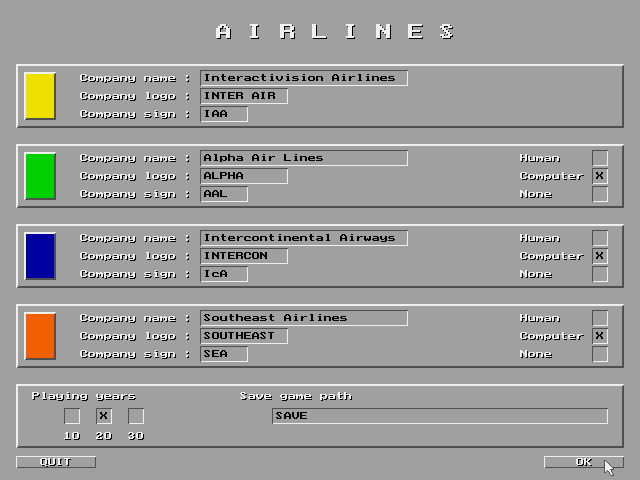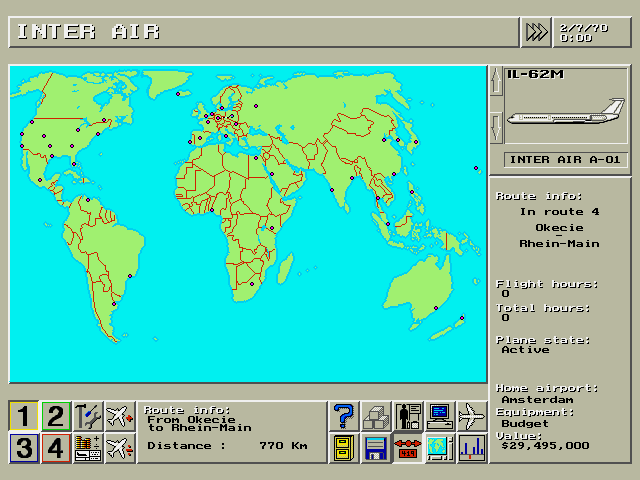Retro Replay Review
Gameplay
Airlines delivers a classic mid-nineties economic simulation experience, putting you in full control of your own global airline company. Right from the outset, you start with a few million dollars in capital and complete ownership of a stock corporation. Your primary tasks revolve around purchasing aircraft, plotting flight routes on a world map, setting ticket prices, and deciding whether to carry passengers or commodities. Once your routes are established, the game’s engine takes over day-to-day operations, allowing you to focus on strategic expansion and financial health.
(HEY YOU!! We hope you enjoy! We try not to run ads. So basically, this is a very expensive hobby running this site. Please consider joining us for updates, forums, and more. Network w/ us to make some cash or friends while retro gaming, and you can win some free retro games for posting. Okay, carry on 👍)
Much of the gameplay involves monitoring detailed financial reports and balance sheets. You’ll keep an eye on revenues, expenses, and key performance indicators such as load factors and on-time performance. Random events like strikes, oil crises, or economic downturns can disrupt your operations, forcing you to adjust ticket prices on the fly, sell portions of your stock to raise emergency funds, or even retire older, less efficient aircraft. This constant need for adaptation adds tension and keeps the decision-making loop engaging.
The depth of the simulation becomes apparent when comparing different plane models. Each aircraft is defined by statistics such as range, seating capacity, fuel efficiency, and purchase price. Deciding which jet to deploy on transcontinental versus short-haul routes is a puzzle in itself, as mismatches can lead to under-filled cabins or high operating costs. Long-term success hinges on balancing risk and reward: aggressive fleet expansion can boost market share but also expose you to crippling debt if a sudden event sends your stock price plummeting.
Graphics
Visually, Airlines embraces the aesthetic of its era with clean, functional 2D interfaces and minimalistic icons. The world map is rendered in simple colors, showing continents, major airports, and route lines with no 3D embellishments. While this may strike modern players as rudimentary, the uncluttered design ensures that critical information—such as flight paths, aircraft status, and profit margins—is always legible at a glance.
Aircraft sprites and airport symbols are basic but purposefully distinct. Different plane types are represented by unique icons, making it easy to pick out wide-body jets versus turboprops on your route network. Menu screens rely heavily on text and tables for displaying financial data, route performance, and fleet statistics. Though there’s no flashy animation or cinematic flair, the straightforward presentation reflects the game’s emphasis on numbers and strategy rather than visual spectacle.
Sound effects are equally restrained: click-driven UI sounds, occasional engine roars when dispatching a flight, and simple notification alerts for events like stock purchases or strikes. There’s no overt soundtrack to speak of, so players often rely on their own music or silence while poring over the economic dashboards. While this sparse audio-visual approach won’t wow those seeking high-end production values, it keeps you focused squarely on the strategic core of running an airline.
Story
Airlines does not weave a traditional narrative with characters or scripted plot twists; instead, the “story” unfolds organically through your decisions and the evolving market environment. You’re cast as an entrepreneur carving out a place in the competitive airline industry, and each fiscal year brings new challenges and opportunities. The drama emerges from financial reports, boardroom pressures, and market fluctuations rather than from cutscenes or dialogue trees.
Random events serve as the closest approximation to a storyline. A sudden oil crisis might plunge fuel costs to record highs, forcing you to ground corners of your fleet or raise ticket prices. Labor strikes at key hubs can disrupt your busiest routes, testing your crisis-management skills. These incidents create memorable moments that punctuate the otherwise steady rhythm of buying planes and adjusting fares, giving you anecdotal tales to share about “the year the oil prices tripled.”
Ultimately, the narrative is what you make of it. Did you build a transcontinental empire linking major capital cities? Did you niche-down to regional hops with turboprops and become the go-to carrier for remote destinations? Your personal successes and setbacks form the core of the story, making Airlines more of a sandbox for crafting your own business saga than a linear tale guided by developers.
Overall Experience
Airlines stands out as a purebred economic simulation that prioritizes depth and authenticity over glitz and spectacle. Its mid-nineties presentation will feel nostalgic to veteran sim fans, while newer players may find the reliance on spreadsheets and static screens refreshingly different from today’s heavily scripted experiences. The satisfaction comes from mastering route networks, optimizing fleet composition, and weathering unpredictable market swings.
This game’s learning curve can be steep: newcomers to the genre might be overwhelmed by financial jargon, endless tables, and the necessity of strategic foresight. However, for those who relish number-crunching and long-term planning, Airlines offers a highly rewarding challenge. Each successful quarterly report, profitable new route, or cleverly managed crisis reinforces your sense of accomplishment and investment in the company you’ve built.
In terms of replayability, Airlines shines through its open-ended nature. You can restart with different market conditions, set yourself goals like becoming the world’s largest cargo carrier, or impose self-challenges such as limiting your fleet to certain plane categories. The lack of scripted endings means you decide when the story is over. If you’re a fan of management sims and looking for a detailed, no-frills airline tycoon, Airlines remains a compelling choice.
 Retro Replay Retro Replay gaming reviews, news, emulation, geek stuff and more!
Retro Replay Retro Replay gaming reviews, news, emulation, geek stuff and more!









Reviews
There are no reviews yet.